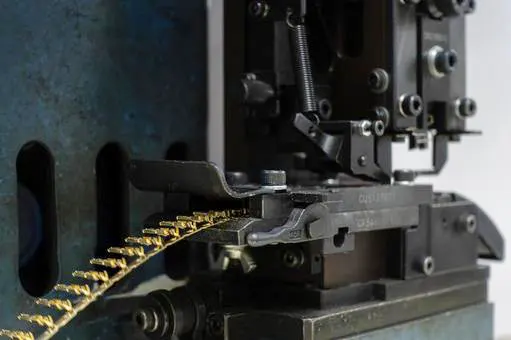Terminal Crimping Optimization and Wire Harness Manufacturing
In modern wire harness manufacturing—whether for new energy vehicles, industrial equipment, or medical devices—terminal crimping plays a crucial role in ensuring both electrical performance and long-term reliability.
A precise crimp determines not only conductivity but also the overall durability and stability of the harness system.
What Is Terminal Crimping?
Terminal crimping is a process that applies controlled pressure to create a tight, permanent mechanical and electrical connection between a wire and its terminal.
Unlike soldering, crimping relies on the plastic deformation of metal to achieve a stable, long-lasting bond.
At Kaweei, crimping is treated as a critical control point in every production stage. Each crimping parameter is measured, recorded, and traceable to guarantee product consistency and reliability.

Key Parameters in the Crimping Process
1. Crimp Height
Crimp height determines the level of conductor compression.
-
If the crimp is too high, the contact becomes loose, increasing electrical resistance.
-
If it’s too low, the wire strands or terminal may be damaged.
Using precision gauges and microscopic inspection, Kaweei ensures every crimp meets the specified tolerance for optimal conductivity and strength.
2. Crimp Width
Crimp width affects both the contact area and the mechanical integrity of the connection.
Different terminal types and wire gauges require accurate matching to prevent fatigue or unstable contact over time.
3. Tensile (Pull) Test
The tensile test is an essential quality verification step.
Following the IPC/WHMA-A-620 international standard, Kaweei performs tensile tests to confirm that every crimp can withstand specified mechanical forces without loosening or failure.
4. Conductor Position and Insulation Support
The conductor must be fully inserted into the crimp barrel, and the insulation must be properly supported without over-compression.
This detail is vital to vibration resistance and long-term electrical stability.
Kaweei defines insertion depth and insulation crimping force at the process-design stage to ensure consistency.
The Value of High-Quality Crimping

A stable and precise crimp directly enhances overall harness performance:
-
Consistent, low-resistance electrical conductivity
-
Strong mechanical retention and pull strength
-
Excellent vibration and corrosion resistance
-
Extended service life of the wire harness
In industries such as automotive electronics, medical devices, and industrial automation, a minor crimping defect can lead to serious electrical failure—making crimp quality control absolutely critical.
Kaweei’s Crimping Technology and Quality Control
As a professional custom wire harness manufacturer, Kaweei operates a complete, automated crimping and inspection system to guarantee product quality from raw materials to final assembly.
Kaweei Crimping Advantages
-
Utilizes Molex, JST, TE Connectivity, and other global-brand terminals and tooling
-
Employs high-precision automated crimping machines for consistent results
-
Performs 100% visual inspection and tensile testing according to IPC/WHMA-A-620
-
Maintains data recording and full traceability under ISO quality management
-
Continuously refines crimping parameters to improve reliability and repeatability
Kaweei provides end-to-end custom wire harness solutions—from material selection and terminal configuration to process optimization and final testing.
Our products are widely used in:
-
New energy vehicles (EVs)
-
Medical and laboratory equipment
-
Industrial automation systems
-
Communication and consumer electronics
Need a custom wire harness or cable assembly?
Contact us today to start your next project with confidence.
Kaweei Wire Harness Manufacturer – FAQ
1. What does Kaweei specialize in?
Kaweei specializes in custom wire harness and cable assembly manufacturing, providing complete solutions from design and material selection to terminal crimping, assembly, and testing.
2. What industries does Kaweei serve?
Kaweei supplies high-quality wire harnesses for automotive electronics, new energy vehicles (EVs), industrial automation, and medical equipment, supporting both small-batch and mass production projects.
3. How does Kaweei ensure product quality?
All harnesses are produced under ISO-certified quality management, using automated crimping machines and following IPC/WHMA-A-620 standards. Every batch undergoes visual inspection, tensile testing, and electrical continuity tests.
4. What are the advantages of Kaweei’s wire harness solutions?
Kaweei’s harnesses offer stable electrical conductivity, strong mechanical strength, and excellent vibration and corrosion resistance. Our precision crimping process ensures long-term performance and reliability.
5. Can Kaweei provide custom designs or OEM/ODM service?
Yes. Kaweei offers fully customized wire harness design and production, based on customer drawings, samples, or technical requirements. Our engineering team provides one-stop support from concept to final delivery.




